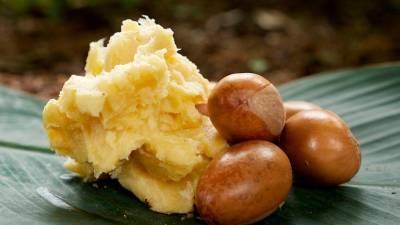SAKI: Nigeria’s six-month ban on shea nut exports has created immediate hardship for producers despite government ambitions to transform the industry. Africa’s most populous country produces approximately 40% of the world’s shea nut supply, used to make shea butter for soaps, lotions and cosmetics.
The west African nation currently sits at the bottom of the supply chain, exporting nearly all its nuts and capturing only 1% of the global market share for shea products worth $6.5 billion. Authorities implemented the export ban last month without warning or industry consultation to spur local butter production. The sudden move has thrown the livelihoods of producers into chaos while they await the promised economic benefits.
Adija Rahman, a 45-year-old mother of six sorting nuts near her home in Saki, expressed frustration with the government’s approach. She pointed out that where 25 kilograms of nuts used to sell for 35,000 naira ($23), that same quantity now fetches only 15,000 naira. Moving up the value chain by switching from raw material exports to finished products represents a key step in economic development according to economists. Despite Nigeria’s oil wealth, millions live in poverty while agricultural output focuses on exporting raw materials after years of government mismanagement.
Critics argue the shea nut ban lacks a clear roadmap for increasing local production and disrupts existing contracts between producers and buyers. Babatunde Olarewaju, an agronomist and agriculture expert, warned that farmers cannot sell enough product due to low local demand while exporters cannot meet previously signed contracts. The few existing processing companies stand to benefit massively from the policy, with Olarewaju warning of potential monopoly conditions as they become the only buyers. Nigeria joins several west African countries including Burkina Faso, Mali, Ivory Coast, Togo and Ghana in implementing such export restrictions.
Vice President Kashim Shettima stated the ban aims to generate around $300 million annually in the short term by securing raw materials for processing factories. The policy intends to help domestic factories run at full capacity while boosting rural incomes and jobs according to government statements. Beyond formal factories, shea butter has long been produced locally in Nigeria and other west African countries by women artisans outside regulatory certification systems. Mohammed Ahmed Kontagora, President of the National Shea Product Association of Nigeria, acknowledged no consultation occurred but offered support for the initiative as a good long-term policy.
Increased local shea production could lead to cheaper prices for Nigerian-made beauty products according to Ikemesit Effiong of Lagos-based consultancy SBM Intelligence. Immediate consequences include falling raw nut prices and trucks being turned back due to cancelled orders according to Abd-Kabir Adedeji, a 32-year-old vendor in Saki. Risikat Ismail, another shea nut seller, criticized the sudden implementation without advance notice as pure wickedness. For Rahman and thousands of mostly female Nigerian cultivators working in the informal economy, the ban has brought debt and uncertainty about covering children’s school fees typically funded by annual profits of 200,000-250,000 naira. – AFP
